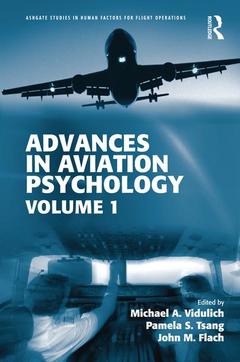Advances in Aviation Psychology Volume 1 Ashgate Studies in Human Factors for Flight Operations Series
Coordonnateurs : Vidulich Michael A., Tsang Pamela S., Flach John

Michael A. Vidulich is a Senior Scientist at the Air Force Research Laboratory’s Human Effectiveness Directorate’s Applied Neuroscience Branch. He served as the Technical Advisor for the Warfighter Interface Division from 2006 to 2013. He is also a member of the adjunct faculty of the Wright State University Department of Psychology, where he has taught since 1989. Previously, he was a research psychologist at NASA Ames Research Center. He received a B.A. (Psychology) from State University College of New York at Potsdam, a M.A. (Psychology) from The Ohio State University, and a Ph.D. (Engineering Psychology) from the University of Illinois at Urbana-Champaign. His research specializes in cognitive metrics for human-machine interface, evaluation, and adaptation. He co-edited the volume, Principles and Practice of Aviation Psychology with Pamela Tsang. Pamela S. Tsang is professor of psychology at Wright State University in Dayton, Ohio. Previously, she was a National Research Council post doctoral fellow at NASA-Ames Research Center. She received her A. B. (Psychology) from Mount Holyoke College and her Ph.D. (Engineering Psychology) from the University of Illinois at Urbana-Champaign. Her research interests are attention and performance, extralaboratory-developed expertise, cognitive aging, and aviation psychology. She is interested in applications of her research in a wide variety of domains that include aviation, surface transportation, and medicine. She co-edited the volume, Principles and Practice of Aviation Psychology with Michael Vidulich. John M. Flach received his Ph.D. (Human Experimental Psychology) from The Ohio State University in 1984. John was an assistant professor at the University of Illinois from 1984 to 1990 where he held joint appointments in the Department of Mechanical & Industrial Engineering, the Psychology Department, and the Institute of Aviation. In 1990 he joined the Psychology Department at Wright State University. He served as<
Date de parution : 12-2014
15.6x23.4 cm
Date de parution : 10-2017
15.6x23.4 cm
Thèmes d’Advances in Aviation Psychology :
Mots-clés :
situation; awareness; paassen; adaptive; automation; work; domain; runway; incursion; air; Transcranial Direct Current Stimulation; High Difficulty Condition; Synthetic Task Environments; Federal Aviation Administration; FAA; Glide Path; Runway Incursion; Adaptive Automation; WDA; ATC Controller; Situation Awareness; GA Pilot; Incursion Management; MEC; Total Flight Hours; HITL Simulation; Specific Work Domains; Pilot Rating; Low Difficulty Condition; Side Slip; Triadic Perspective; Incursion Scenario; Unforeseen Situations; Intentional Layer; Intentional Constraints



